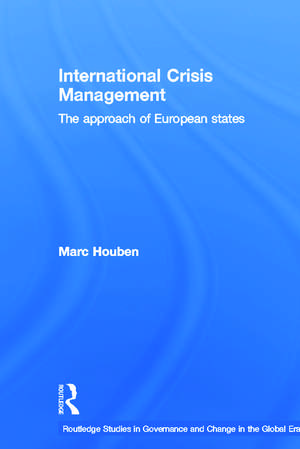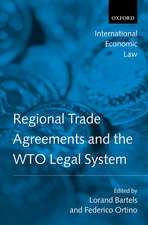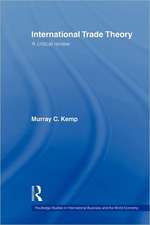International Crisis Management: The Approach of European States: Routledge Studies in Governance and Change in the Global Era
Autor Marc Houbenen Limba Engleză Paperback – 13 sep 2012
| Toate formatele și edițiile | Preț | Express |
|---|---|---|
| Paperback (1) | 303.43 lei 6-8 săpt. | |
| Taylor & Francis – 13 sep 2012 | 303.43 lei 6-8 săpt. | |
| Hardback (1) | 1061.06 lei 6-8 săpt. | |
| Taylor & Francis – 10 dec 2004 | 1061.06 lei 6-8 săpt. |
Preț: 303.43 lei
Preț vechi: 358.61 lei
-15% Nou
Puncte Express: 455
Preț estimativ în valută:
58.07€ • 63.05$ • 48.78£
58.07€ • 63.05$ • 48.78£
Carte tipărită la comandă
Livrare economică 22 aprilie-06 mai
Preluare comenzi: 021 569.72.76
Specificații
ISBN-13: 9780415655248
ISBN-10: 0415655242
Pagini: 338
Dimensiuni: 156 x 234 x 21 mm
Greutate: 0.64 kg
Ediția:1
Editura: Taylor & Francis
Colecția Routledge
Seria Routledge Studies in Governance and Change in the Global Era
Locul publicării:Oxford, United Kingdom
ISBN-10: 0415655242
Pagini: 338
Dimensiuni: 156 x 234 x 21 mm
Greutate: 0.64 kg
Ediția:1
Editura: Taylor & Francis
Colecția Routledge
Seria Routledge Studies in Governance and Change in the Global Era
Locul publicării:Oxford, United Kingdom
Cuprins
Part One: Problem definition and framework of analysis
1. Introduction and plan of the book
1.1 The double political problem of international crisis management
1.2 Preconditions versus 'criteria for intervention'
1.3 Research questions and methodology
1.4 Defining the key terms: ambiguities and conundrums
2. Elements of change
2.1 The twin processes of normalisation and domestication
2.2 Process and principles of self-organisation
2.3 On the nature of the crisis
3. Three propositions
3.1 States are sovereign, only marginally free
3.2 The imperative of cooperation
3.3 All states are constrained
Part Two: The case studies: a comparative analysis
4. Changing the rules:Belgium and the Netherlands
4.1 Belgium
4.2 The Netherlands
4.3 Concluding remarks
5. The imperative of consensus: Denmark and Norway
5.1 Denmark
5.2 Norway
5.3 Concluding remarks
6. The dominant government: the United Kingdom, France and Spain
6.1 The United Kingdom
6.2 France
6.3 Spain
6.4 Concluding remarks
7. The dominant parliament: Germany and Italy
7.1 Germany
7.2 Italy
7.3 Concluding remarks
Part Three: Comparative analysis and conclusions
8. National preconditions and multinational action
8.1 Nature and charactersistics of the national decision-making process
8.2 Do participation decisions fit a general pattern?
8.3 How and why do governments precondition their participation?
8.4 What are the consequences for multinational action?
9. The relation between government and parliament
9.1 Binding the government
9.2 Obtaining and sustaining domestic support
9.3 Does national decision-making improve if preconditions are formalised?
9.4 Parliamentary scrutiny and evaluation
9.5 Parliament as a democratic learning mechanism
Annex. The review framework of the Netherlands
1. Introduction and plan of the book
1.1 The double political problem of international crisis management
1.2 Preconditions versus 'criteria for intervention'
1.3 Research questions and methodology
1.4 Defining the key terms: ambiguities and conundrums
2. Elements of change
2.1 The twin processes of normalisation and domestication
2.2 Process and principles of self-organisation
2.3 On the nature of the crisis
3. Three propositions
3.1 States are sovereign, only marginally free
3.2 The imperative of cooperation
3.3 All states are constrained
Part Two: The case studies: a comparative analysis
4. Changing the rules:Belgium and the Netherlands
4.1 Belgium
4.2 The Netherlands
4.3 Concluding remarks
5. The imperative of consensus: Denmark and Norway
5.1 Denmark
5.2 Norway
5.3 Concluding remarks
6. The dominant government: the United Kingdom, France and Spain
6.1 The United Kingdom
6.2 France
6.3 Spain
6.4 Concluding remarks
7. The dominant parliament: Germany and Italy
7.1 Germany
7.2 Italy
7.3 Concluding remarks
Part Three: Comparative analysis and conclusions
8. National preconditions and multinational action
8.1 Nature and charactersistics of the national decision-making process
8.2 Do participation decisions fit a general pattern?
8.3 How and why do governments precondition their participation?
8.4 What are the consequences for multinational action?
9. The relation between government and parliament
9.1 Binding the government
9.2 Obtaining and sustaining domestic support
9.3 Does national decision-making improve if preconditions are formalised?
9.4 Parliamentary scrutiny and evaluation
9.5 Parliament as a democratic learning mechanism
Annex. The review framework of the Netherlands
Notă biografică
Marc Houben holds master's degrees in philosophy and information management and a doctorate in social sciences. He has written about issues in philosophy, public policy, strategy and security and saw action in several crisis management operations as an officer in the Royal Netherlands Marine Corps.
Descriere
A comparative analysis of the preconditions and constraints nine European states place on their participation in international crisis management operations.





























